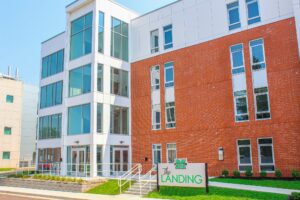The FEPAC-accredited Forensic Science Graduate Program at Marshall University is a two-year academic program leading to a Master of Science in Forensic Science (MSFS). Nationally the MSFS at Marshall University is one of a limited number of FEPAC accredited graduate-level programs (aafs.org). MUFSP offers a unique opportunity for students to learn in and near accredited (ISO 17025) forensic testing and DNA data basing labs.
With the increasing introduction of scientific evidence into court testimony and the demand for standardized educational programs, MUFSP satisfies federal and state standards and guidelines to enable its graduates to enter this fascinating field well equipped to respond to future challenges.
On-site research and service forensic laboratories at the Marshall University Forensic Science Center (MUFSC) provide students with opportunities to participate in inner workings of a forensic laboratory. These include accredited laboratories providing parentage testing, and DNA casework, as well as forensic chemistry, digital forensics, and microscopy/comparative sciences. Off-site internships are also available.
The program includes a five-semester core curriculum with both thesis and non-thesis options. In addition to this strong, broad-based core curriculum, four areas of emphasis are offered that allow students to obtain additional in-depth education and training. Students may select any combination of the emphases, up to 4, which may be completed in the standard five semester program. These areas of emphasis include Crime Scene Investigation, Digital Forensics, DNA Analysis, and Forensic Chemistry.
While one area of emphasis is required, students may complete up to four areas of emphasis during their standard five-semester course of study. Completing multiple areas of emphasis is contingent on maintaining good academic standing while enrolled in the program. Our program is unique in that it encourages a variety of specializations.
Core Curriculum
| Course Number | Course Name & Description | Credit Hours |
|---|---|---|
| FSC 604 | Genetics and DNA Technologies A comprehensive lecture series that covers the genetics and biochemistry of DNA to include the analysis, ethical considerations and quality assurance techniques used to analyze DNA for identification purposes. This course serves as a core course in the forensic science curriculum. |
3 |
| FSC 606 | Crime Scene and Death Investigation Establishes foundations and techniques for proper crime scene investigation with or without a victim’s body. Logical approach for collecting evidence and documenting scene and collection process. |
3 |
| FSC 612 | Forensic Microscopy Introduction to various types of microscopy used in forensics, including scanning electron microscopy, light and fluorescence microscopy and polarizing microscopy. |
2 |
| FSC 618 | Forensic Comparative Sciences Introduction to comparative methods used by forensic scientists for analysis of fingerprints, questioned documents, and firearms. |
2 |
| FSC 619 | Forensic Statistics Basic theory of probability and statistics, odds from Bayes’ theorem for transfer evidence, likelihood ratio, population and statistical genetics, statistical issues in paternity testing and mixtures, and presenting evidence. (PR: Admission to Forensic Science program) |
3 |
| FSC 622 | Forensic Analytical Chemistry Analytical chemistry instrumentation and methods used by forensic scientists for analysis of drugs, toxicology, arson, explosives, trace evidence, and sample collection and processing. |
3 |
| FSC 623 | Forensic Analytical Chemistry Lab Analytical chemistry instrumentation and methods used by forensic scientists for analysis of drugs, toxicology, arson, explosives, trace evidence, and sample collection and processing. |
1 |
| FSC 624 | Biochemistry This comprehensive course in biochemistry focuses on concepts appropriate to forensic science and designed to meet forensic science educational standards at a national level. |
4 |
| FSC 630 | Forensic Science Internship A 10-week internship in a crime lab or other forensic science-related research laboratory. Application of principles and techniques learned during first year of program. (PR: Completion of two semesters in Forensic Science program) |
5 |
| FSC 632 | Foundations & Fundamentals in Digital Forensics The course provides fundamental information to lay the foundation for the Digital Forensics area of emphasis. A range of topics includes laws and regulations relating to stored digital data; quality assurance and ethics in a digital laboratory; basic terminology; computer hardware and various storage media; software, including operating and file systems; and basic concepts of computer security. The course is taught primarily in a lecture format. Class discussions and participation in practical exercises supplement lectures. |
3 |
| FSC 665 | Legal Issues in Forensic Science Covers the American legal system with specific emphasis on expert witnessing by forensic scientists. Both the federal and state systems of justice are addressed, plus topics such as the federal rules of evidence and discovery. Frye and Daubert considerations on admissibility of scientific evidence and expert witnessing are discussed. Mock trials provide experience in the courtroom. (PR: Consent of Instructor) |
3 |
| FSC 680 | Seminar (semesters 1, 2, 4, 5) Faculty, student and guest speaker presentations of topics pertinent to forensic science. |
4 |
| Approved Elective Not required if enrolled in more than one Area of Emphasis. |
3 | |
| Total Credit Hours | 39 | |
